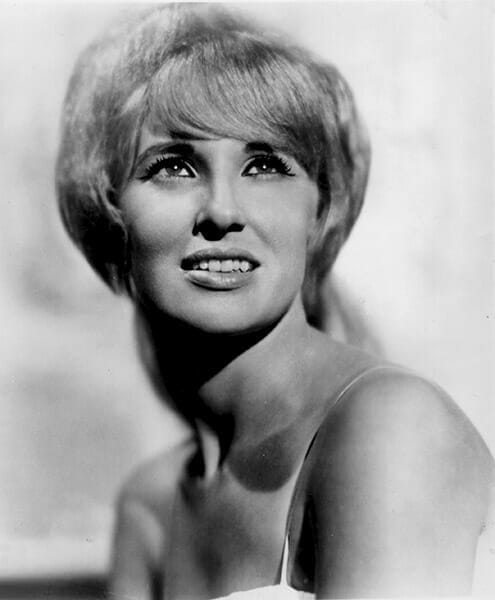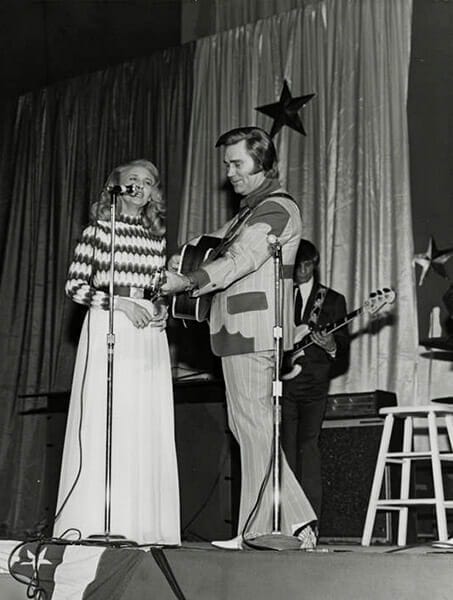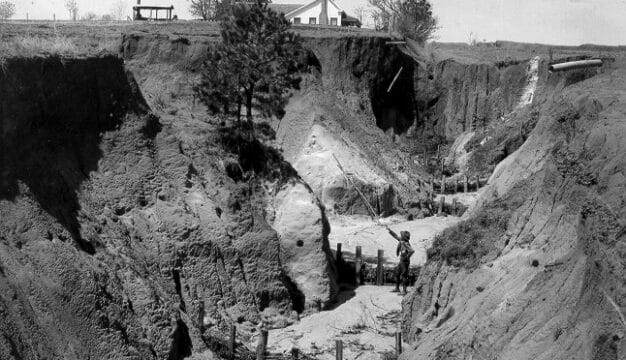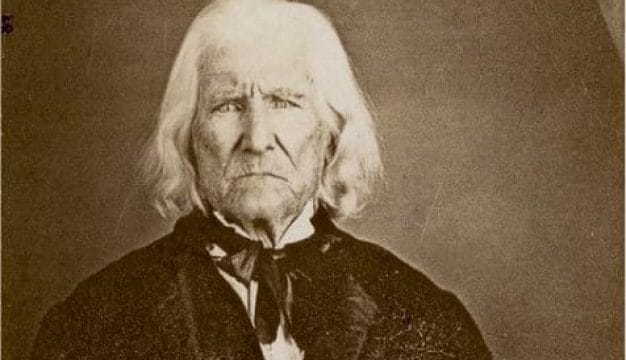Tammy Wynette
 Tammy Wynette
Known at the “First Lady of Country Music,” Grammy Award-winning Tammy Wynette (1942-1998) was born in Mississippi but spent much of her childhood in Alabama and considered Red Bay, Franklin County, her adopted hometown. Her tumultuous life and career saw her top the country music charts with numerous hits but also suffer health problems and several failed marriages. Although she only lived in Alabama for a short time, she visited often, and a local Birmingham television show first brought her talents to the attention of the public.
Tammy Wynette
Known at the “First Lady of Country Music,” Grammy Award-winning Tammy Wynette (1942-1998) was born in Mississippi but spent much of her childhood in Alabama and considered Red Bay, Franklin County, her adopted hometown. Her tumultuous life and career saw her top the country music charts with numerous hits but also suffer health problems and several failed marriages. Although she only lived in Alabama for a short time, she visited often, and a local Birmingham television show first brought her talents to the attention of the public.
Wynette was born Virginia Wynette Pugh on May 5, 1942, on a farm outside Tremont, Mississippi. She was the only child of Mildred Faye Russell, an office worker and substitute teacher, and William Hollice Pugh, a farmer and musician. Wynette’s father died when she was nine months old, and her mother left her to be raised by her parents, Thomas and Flora Russell, whose farm straddled the border with Alabama; the rural home had no indoor plumbing. Wynette had a natural gift for music and taught herself to play her father’s instruments, which her mother had brought to the home as well. Throughout her childhood, Wynette spent many days in Red Bay shopping and going to the movies and visiting relatives who lived in the town. Wynette attended Tremont High School, where she was a leading scorer on the school’s basketball team, and she played piano and sang at her local church. A few months before graduation in 1960, Wynette married local construction worker Euple Byrd, with whom she would have three daughters. Byrd changed jobs frequently, and the family moved often. In 1963, Wynette graduated from a beauty school in Tupelo, Mississippi, and became a licensed hair dresser. Harboring dreams of becoming a singer, Wynette performed at local nightclubs in Tupelo at night.
Around 1964, just before the birth of her third daughter, Wynette divorced Byrd and moved to Alabama, living in the Elyton Village housing project outside Birmingham, where she worked for several years as a beautician. She had not given up her dream of being a singer and performed in the evenings at local bars. In 1965, she came to the attention of the producers of the Country Boy Eddie Show, a morning television program that often highlighted unknown local musicians. Wynette’s singing talents earned her a regular spot on the show, and she rose early to perform and then went to her hairdresser’s job for the rest of the day. Hoping to increase her chances of a recording career, she traveled to Nashville, the mecca for country musicians, several times seeking a contract and soon came to the attention of Grand Ole Opry star Porter Wagoner, who featured her on his nationally syndicated television series. She moved to Nashville with her daughters in 1966 and was signed to Epic Records by fellow Alabamian Billy Sherrill. It was at this time that she officially changed her name to Tammy Wynette, chosen for lead female character in the 1957 film Tammy and the Bachelor.
 Tammy Wynette and George Jones
In 1967, Wynette had three top singles on the country music charts: “My Elusive Dreams,” “Take Me to Your World, and “I Don’t Wanna Play House,” which earned her a 1968 Grammy Award. Also in 1967, Wynette married singer Don Chapel. The following year, she released the two songs that brought her lasting and worldwide fame: “D-I-V-O-R-C-E” and one of country music’s most popular and widely covered numbers, “Stand by Your Man.” The latter garnered her a second and final Grammy Award, but she continued to earn nominations in subsequent years. In 1968, her name was featured in the entertainment news over her affair with country music star George Jones. She would divorce Chapel in 1968 and enter into a seven-year turbulent marriage but successful recording relationship with Jones, who suffered from severe alcoholism and substance abuse. The couple, who had one daughter, divorced in 1975 but continued to regularly record duets until 1980. Wynette also continued to release solo material during this period, topping the charts with such songs as “Another Lonely Song” and “Til’ I Can Make It On My Own.” In 1969, she released a greatest hits album that was the first certified gold record by a female country star. She would win the Country Music Association Female Vocalist of the Year Award in 1968, 1969, and 1970. During Alabama governor George Wallace‘s third re-election campaign in 1974, Wynette sang “Stand By Your Man” at several of his rallies. In 1976, she married real estate executive Michael Tomlin, but the marriage lasted only six weeks. Two years later, she married songwriter George Richardson (known professionally as George Richey), who would become her manager. In 1978, Wynette reported that she was kidnapped and beaten. Her children later claimed that the report was fabricated to cover up physical abuse by Richey, claims which he denied.
Tammy Wynette and George Jones
In 1967, Wynette had three top singles on the country music charts: “My Elusive Dreams,” “Take Me to Your World, and “I Don’t Wanna Play House,” which earned her a 1968 Grammy Award. Also in 1967, Wynette married singer Don Chapel. The following year, she released the two songs that brought her lasting and worldwide fame: “D-I-V-O-R-C-E” and one of country music’s most popular and widely covered numbers, “Stand by Your Man.” The latter garnered her a second and final Grammy Award, but she continued to earn nominations in subsequent years. In 1968, her name was featured in the entertainment news over her affair with country music star George Jones. She would divorce Chapel in 1968 and enter into a seven-year turbulent marriage but successful recording relationship with Jones, who suffered from severe alcoholism and substance abuse. The couple, who had one daughter, divorced in 1975 but continued to regularly record duets until 1980. Wynette also continued to release solo material during this period, topping the charts with such songs as “Another Lonely Song” and “Til’ I Can Make It On My Own.” In 1969, she released a greatest hits album that was the first certified gold record by a female country star. She would win the Country Music Association Female Vocalist of the Year Award in 1968, 1969, and 1970. During Alabama governor George Wallace‘s third re-election campaign in 1974, Wynette sang “Stand By Your Man” at several of his rallies. In 1976, she married real estate executive Michael Tomlin, but the marriage lasted only six weeks. Two years later, she married songwriter George Richardson (known professionally as George Richey), who would become her manager. In 1978, Wynette reported that she was kidnapped and beaten. Her children later claimed that the report was fabricated to cover up physical abuse by Richey, claims which he denied.
The 1980s saw a decline in Wynette’s sales and chart successes, although four of her singles reached the top 20 of the country charts. In 1985, she performed with George Jones at the inaugural gala of the Alabama Music Hall of Fame at Boutwell Auditorium in Birmingham. Plagued by various health problems, including several surgeries, Wynette became addicted to pain medication and was admitted to the Betty Ford Clinic rehab facility in 1986. The following year, however, she was given a recurring role on the soap opera Capitol, and the three albums she released during this decade—Sometimes When We Touch, Higher Ground, and Next to You—had decent sales. In 1988, she was forced to declare bankruptcy over failed investments. In 1990, Wynette returned to Red Bay for a ceremony dedicating a section of State Highway 23, which Wynette traveled frequently between Tremont and Red Bay, as the Tammy Wynette Highway.
 Tammy Wynette
In 1992, Wynette enjoyed an unexpected comeback thanks to her collaboration with a British electronic dance duo, The KLF. Their song “Justified and Ancient (Stand by the JAMs)” topped the pop charts in more than 12 countries and brought Wynette to a new and wider audience. In 1993, she released Honky Tonk Angels, an album also featuring fellow country legends Dolly Parton and Loretta Lynn; it was certified gold in 1994, selling more than 500,000 copies. She was also inducted into the Alabama Music Hall of Fame that year. In 1994, she released Without Walls, a collaborative album with such guest stars as Sting, Elton John, and Smokey Robinson. Soon after its release, however, Wynette’s health began to decline significantly, but she rallied enough in 1995 to record a final album with George Jones and embark on a promotional tour that ran through 1997. Her health continued to fail, however, and she died of heart failure on April 6, 1998, in Nashville and her cremated remains were interred there at Woodlawn Cross Mausoleum. She was inducted into the Country Music Hall of Fame posthumously later that year. Over her career, she released some 30 solo albums and numerous compilation albums and collaborations, mostly with George Jones.
Tammy Wynette
In 1992, Wynette enjoyed an unexpected comeback thanks to her collaboration with a British electronic dance duo, The KLF. Their song “Justified and Ancient (Stand by the JAMs)” topped the pop charts in more than 12 countries and brought Wynette to a new and wider audience. In 1993, she released Honky Tonk Angels, an album also featuring fellow country legends Dolly Parton and Loretta Lynn; it was certified gold in 1994, selling more than 500,000 copies. She was also inducted into the Alabama Music Hall of Fame that year. In 1994, she released Without Walls, a collaborative album with such guest stars as Sting, Elton John, and Smokey Robinson. Soon after its release, however, Wynette’s health began to decline significantly, but she rallied enough in 1995 to record a final album with George Jones and embark on a promotional tour that ran through 1997. Her health continued to fail, however, and she died of heart failure on April 6, 1998, in Nashville and her cremated remains were interred there at Woodlawn Cross Mausoleum. She was inducted into the Country Music Hall of Fame posthumously later that year. Over her career, she released some 30 solo albums and numerous compilation albums and collaborations, mostly with George Jones.
In 2012, Wynette was again the subject of controversy when her stepdaughter, Richey’s daughter, removed the plaque on her crypt and replaced it with one bearing Wynette’s married name: Virginia W. Richardson. Wynette’s other children decried the change and also have been involved in efforts to sue for shares of their mother’s estate.
Tammy Wynette is remembered and celebrated in her adopted hometown of Red Bay at the Red Bay Museum, which houses a large collection of Wynette memorabilia, costumes, and other items donated by her daughters.



